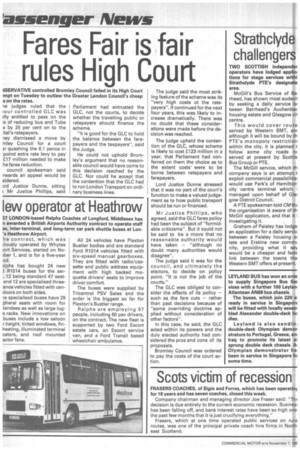rules High Court
Page 12

If you've noticed an error in this article please click here to report it so we can fix it.
kISERVATIVE controlled Bromley Council failed in its High Court Impt on Tuesday to outlaw the Greater London Council's cheap s on the rates.
le judges ruled that the rour controlled GLC was illy entitled to pass on the of reducing bus and Tube s by 25 per cent on to the ital's ratepayers.
ley dismissed a move by mley Council for a court Dr. quashing the 6.1 pence in poind extra rate levy to pay £17 million needed to make he fares reduction,
council spokesman said rwards an appeal would be sidered.
)rd Justice Dunne, sitting I Mr Justice Phillips, said Parliament had entrusted the GLC, not the courts, to decide whether the travelling public or ratepayers should finance the scheme.
"It is good for the GLC to hold the balance between the farepayers and the taxpayers", said the Judge.
He could not uphold Bromley's argument that no reasonable council would have come to this decision reached by the GLC. Nor could he accept that the contention that the GLC had to run London Transport on ordinary business lines. The judge said the most striking feature of the scheme was its "very high costs ot the ratepayers". If continued for the next four years, this was likely to increase dramatically. There was no doubt that these considerations were made before the decision was reached.
The judge upheld the contention of the GLC, whose scheme is likely to cost £123 million in a year, that Parliament had conferred on them the choice as to the extent costs were to be borne between ratepayers and farepayers.
Lord Justice Dunne stressed that it was no part of the court's function to make a valued judgement as to how public transport should be run or financed.
Mr Justice Phillips, who agreed, said the GLC fares policy had been the subject of "formidable criticisms". But it could not be said to be a move that no reasonable authority would have taken — "although no doubt many authorities would disagree".
The judge said it was for the council, and ultimately the electors, to decide on policy point. "It is not the job of the courts."
The GLC was obliged to consider the effects of its policy — such as the fare cuts — rather than past decisions because of "some overriding doctrine applied without consideration of other factors".
In this case, he said, the GLC acted within its powers and the duly elected authority had considered the pros and cons of its proposals.
Bromley Council was ordered to pay the costs of the court action.












































